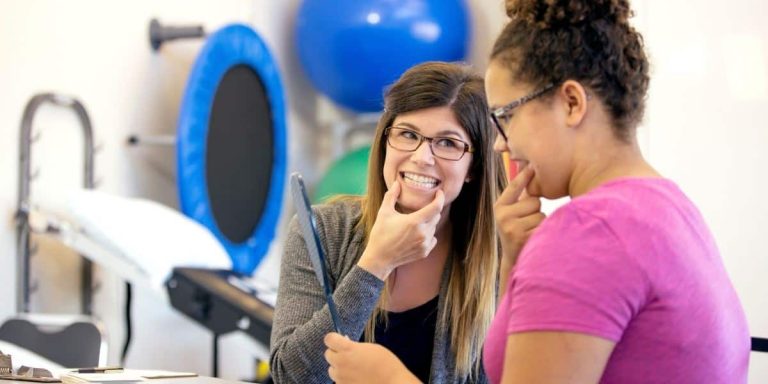What is the Role of a Speech Pathologist?
Speech-language pathologists (SLPs) often work to assess, diagnose, prevent and treat speech, language, social communication and cognitive communication disorders in both children and adults. Speech pathologists usually work with people who have difficulty with communication because of developmental delays, strokes, brain injuries, learning or intellectual disabilities, dementia and hearing loss, as well as other common problems that can affect speech and language.

All speech pathologists have gone under university qualifications. Speech pathology is also a self-regulated profession. Therefore members must meet the Department of Education and Training’s standards in regards to continuing professional development in order to renew as a Certified Practising Speech Pathology Australia member.
Find out more...
Fill in the form below and one of our consultants will be in touch with you regarding our services.
NDIS Speech Pathology
There is a high demand for speech pathologists who are looking to work under the NDIS, hence there is a lot of funded support for speech pathology. Speech pathologists with the appropriate skill and training can provide services that include risk assessment, interventions, prescription and education to families and carers, and therapy programs to help people reach their goals. Speech pathologists that are working under the NDIS have a lot of flexibility on how they want to work. They can deliver services in a clinic, home-based environment or in their respective communities.

All Areas Speech Pathology
Also known as AASpeech, all areas speech therapy is a very common form of pathology service that is centredaround family and education. All areas speech pathology provides service for people of all ages, from babies to children and adults. Their services include speech and language assessments, speech therapy, treatment for swallowing disorders, voice therapy, speech and language screenings, hearing screenings and ear health checks.
Speech Language Pathology
Speech language pathology is a field of expertise often practised by speech language pathologists or a speech and language therapist, both of whom are also known as speech therapists. Speech language pathologists are specialised in the assessment, evaluation, diagnosis and the treatment of communication, voice, swallowing and cognitive disorders. Moreover speech language pathologists play a huge role in the diagnosis and the treatment of autism spectrum disorder. They often do this with a team of psychologists and pediatricians.

Adult Speech Pathology
There are many reasons why you might have a language or a speech disorder. Some problems are caused by childhood traumas, while others happen after an illness or an injury. To help rebuild these skills and/or regain confidence with communication, adults may seek speech pathology. Speech pathology can help the individual to participate fully in conversations, improve their quality of life, improve the individual’s voice and improve social skills overall.

Speech Pathology for Autism
Speech pathologists play an important role in the diagnosis and treatment of autism. They can help the participant with autism to build confidence with communication and social skills in various settings such as home, school, community and work. Speech pathologists can help the participant learn augmentative and alternative communication (AAC) if they need help communicating. Speech pathologists usually work with participants alone or in small groups. Groups can make it easier for the person to practise their social skills easily. Depending on the participants’ goals, speech therapists work on the following skills:
- Getting along with others on a social setting
- Taking turns in a conversation
- Transitioning from a task to another
- Accepting change and working on expanding interests
- Improving reading and writing skills
Occupational Therapy Speech Pathology
Many speech pathologists are familiar with occupational therapy even before entering their own profession. That’s because they both have things in common. Occupational therapists achieve helping patients through the concept of providing job training for the “job of living”. On the other hand, speech therapists are more specialised in their field of work, but there are many ways in which the practice of speech-language pathology can benefit from the assistance of occupational therapists. Both Speech pathologists and occupational therapists work with patients who have feeding, swallowing, cognitive and postural disorders. Even many of their treatment methods are quite similar. So you should talk to your doctor and ask them which one would be better for you.

What is the Difference Between Speech Therapy and Speech Pathology?
Speech pathology and therapy are quiet similar disciplines. The only difference is that a speech pathologist has more medical knowledge to understand impairments. This means that a speech pathologist has more knowledge of actions that need to be taken to improve speech problems. Nevertheless, a speech therapist is a person that takes action with the knowledge that they already have through sessions and interventions.
Speech Pathologists Sydney
Speech disorders are common in Australia, so if you have speech therapy in your NDIS plan, or you think you have a disorder that is preventing you from communicating independently, get in contact with any of our speech pathologists in Sydney and in Liverpool. If you have any suspicion whether anyone close to you might need extra provision, feel free to contact us. You can also ask any question you might need to be answered about our services. As the team of ADACSS, we are here to help anyone that might need help in Sydney or in Liverpool. Get in touch by calling us at 0292327055, send us an email or book online.
Why choose ADACSS?

Free consultation
We will meet with you to offer free advice and support without obligation. We pride ourselves on turning things around quickly.

Individual support package
Everyone's needs and wants are different, therefore we listen to you and make a tailored plan based on your requirements.

Ongoing support
Once everything has been agreed and services commence, we will discuss and feedback on changes if needed.

